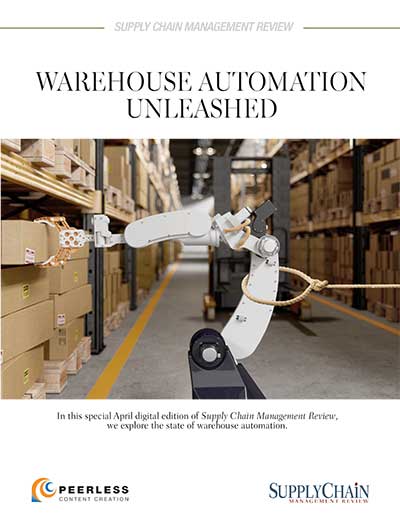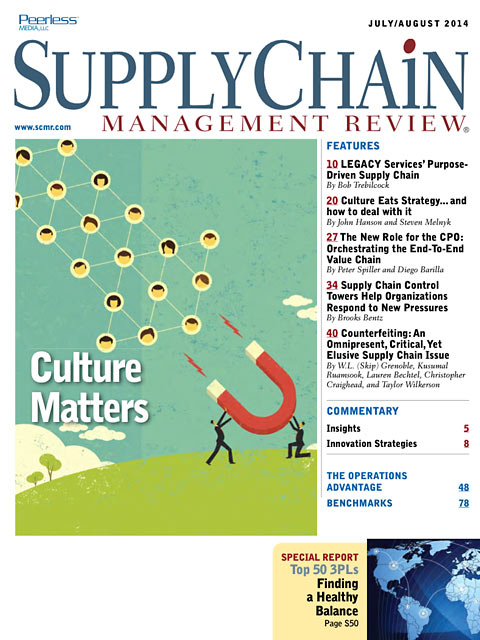Sorry, but your login has failed. Please recheck your login information and resubmit. If your subscription has expired, renew here.
July-August 2014
LEGACY Supply Chain Services has made company culture the centerpiece of how it drives innovation, efficiency, and the creation of value for its customers. Is it a model that others should replicate? Browse this issue archive.Need Help? Contact customer service 847-559-7581 More options
In more and more industries worldwide, outsourcing to specialists is rapidly becoming a necessity for maintaining a competitive edge.
Companies as varied as Skype, Coca Cola, Procter & Gamble, and Apple are acutely aware that their success no longer depends on doing everything themselves. These companies, and many others like them, have defined the business functions they are truly good at. They focus their internal resources on these functions, while tightly orchestrating a value chain, which spans functions from market insight and product development to delivery and customer service, and includes many well-managed external partners and suppliers.
“We are in the business of building and creating brands,” A. G. Lafley, former chief executive of P&G, said in a 2003 interview in Bloomberg Businessweek. Notably, he did not mention manufacturing, distribution, or even product development.
 |
This complete article is available to subscribers
only. Click on Log In Now at the top of this article for full access. Or, Start your PLUS+ subscription for instant access. |
Not ready to subscribe, but need this article?
Buy the complete article now. Only $20.00. Instant PDF Download.
Access the complete issue of Supply Chain Management Review magazine featuring
this article including every word, chart and table exactly as it appeared in the magazine.
SC
MR
Sorry, but your login has failed. Please recheck your login information and resubmit. If your subscription has expired, renew here.
July-August 2014
LEGACY Supply Chain Services has made company culture the centerpiece of how it drives innovation, efficiency, and the creation of value for its customers. Is it a model that others should replicate? Browse this issue archive. Access your online digital edition. Download a PDF file of the July-August 2014 issue.
 |
Download Article PDF |
In more and more industries worldwide, outsourcing to specialists is rapidly becoming a necessity for maintaining a competitive edge.
Companies as varied as Skype, Coca Cola, Procter & Gamble, and Apple are acutely aware that their success no longer depends on doing everything themselves. These companies, and many others like them, have defined the business functions they are truly good at. They focus their internal resources on these functions, while tightly orchestrating a value chain, which spans functions from market insight and product development to delivery and customer service, and includes many well-managed external partners and suppliers.
“We are in the business of building and creating brands,” A. G. Lafley, former chief executive of P&G, said in a 2003 interview in Bloomberg Businessweek. Notably, he did not mention manufacturing, distribution, or even product development.
 |
SUBSCRIBERS: Click here to download PDF of the full article. |
SC
MR

Latest Supply Chain News
- Tech investments bring revenue increases, survey finds
- Survey reveals strategies for addressing supply chain, logistics labor shortages
- Israel, Ukraine aid package to increase pressure on aerospace and defense supply chains
- How CPG brands can deliver on supplier diversity promises
- How S&OP provides the answer to in-demand products
- More News
Latest Resources

 Explore
Explore
Topics
Latest Supply Chain News
- Tech investments bring revenue increases, survey finds
- Survey reveals strategies for addressing supply chain, logistics labor shortages
- Israel, Ukraine aid package to increase pressure on aerospace and defense supply chains
- How CPG brands can deliver on supplier diversity promises
- How S&OP provides the answer to in-demand products
- AI, virtual reality is bringing experiential learning into the modern age
- More latest news
Latest Resources

Subscribe

Supply Chain Management Review delivers the best industry content.

Editors’ Picks





